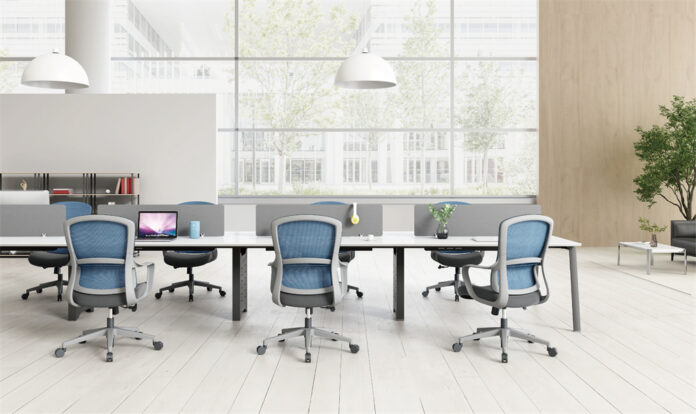In the contemporary landscape of workplace dynamics, employee satisfaction has emerged as a crucial factor in fostering productivity and overall organizational success. While numerous elements contribute to this satisfaction, one often overlooked yet profoundly impactful aspect is the ergonomic design of office furniture, particularly chairs.
Ergonomic office chairs are specifically engineered to provide optimal support and comfort, tailored to the human body’s natural contours and movements.
Beyond mere comfort, these chairs play a pivotal role in enhancing employee well-being, productivity, and job satisfaction.
Understanding Ergonomics in Office Chairs
Ergonomics, the science of designing products and environments to fit the people who use them, is at the core of ergonomic office chair design. These chairs are meticulously crafted to promote good posture and reduce strain on the body, especially during extended periods of sitting. From adjustable lumbar support to customizable armrests and seat height, ergonomic chairs offer a plethora of features to accommodate various body types and preferences.
Investing in ergonomic office chairs signifies a commitment to employee health and well-being. By aligning the chair’s design with the natural mechanics of the human body, employers can mitigate the risk of musculoskeletal disorders and alleviate discomfort commonly associated with traditional office seating.
Enhanced Comfort and Productivity
The impact of ergonomic chairs on employee comfort cannot be overstated. Unlike conventional chairs, which often cause discomfort and fatigue, ergonomic chairs provide a supportive foundation that enables individuals to maintain a proper posture throughout the workday. This reduction in physical strain translates into improved focus, concentration, and productivity.
Moreover, ergonomic chairs empower employees to remain engaged and motivated, as they are not distracted by discomfort or the need to constantly readjust their seating position. By fostering a conducive work environment, characterized by ergonomic furniture, organizations can cultivate a culture of well-being and peak performance among their workforce.
Prevention of Health Issues
Prolonged sitting in non-ergonomic chairs can contribute to a host of health issues, including back pain, neck strain, and even circulation problems. Conversely, ergonomic chairs are designed to mitigate these risks by promoting proper spinal alignment and reducing pressure on key areas of the body. By investing in ergonomic seating solutions, employers can proactively address these health concerns and safeguard the well-being of their employees.
Moreover, preventing health issues through ergonomic interventions can lead to significant cost savings for organizations. Fewer instances of absenteeism, reduced healthcare expenses related to musculoskeletal disorders, and higher employee retention rates are among the tangible benefits associated with prioritizing employee health and safety in the workplace.
Customization and Adaptability
One of the hallmarks of ergonomic office chairs is their adaptability to individual preferences and needs. These chairs often feature adjustable components such as lumbar support, seat depth, and armrests, allowing users to tailor the chair to their unique body dimensions and comfort requirements. This customization not only enhances comfort but also promotes a sense of ownership and personalization among employees.
Additionally, the adaptability of ergonomic chairs ensures their relevance across diverse work environments and tasks. Whether employees are engaged in intensive computer work or collaborative meetings, ergonomic chairs can accommodate varying postures and activities, thereby optimizing both comfort and productivity.
Impact on Employee Morale
Employee satisfaction and morale are closely intertwined with the physical comfort and ergonomic features of their workspace. Providing ergonomic office chairs sends a powerful message to employees that their well-being is valued and prioritized by the organization. This recognition fosters a positive work culture characterized by mutual respect and support.
Furthermore, when employees feel physically comfortable and supported in their workspace, they are more likely to experience higher job satisfaction and a greater sense of loyalty towards their employer. This, in turn, can lead to lower turnover rates and higher levels of employee engagement, ultimately benefiting the organization as a whole.
Long-Term Investment in Employee Health
Viewing ergonomic office chairs as a long-term investment in employee health yields significant returns for organizations. By proactively addressing ergonomic concerns and promoting a healthy work environment, employers demonstrate a commitment to their workforce’s well-being. This proactive approach not only minimizes the risk of workplace injuries but also contributes to a positive organizational culture centered on employee health and safety.
Furthermore, the long-term benefits of investing in ergonomic chairs extend beyond physical health to encompass psychological well-being. Employees who are comfortable and supported in their workspace are more likely to experience reduced stress levels and increased job satisfaction, leading to higher morale and productivity levels.
Promotion of Well-Being and Work-Life Balance
In today’s fast-paced work environment, promoting employee well-being and work-life balance is paramount. Ergonomic office chairs play a crucial role in this endeavor by providing a comfortable and supportive workspace where employees can perform their tasks without experiencing undue physical strain or discomfort. By prioritizing the health and comfort of their employees, organizations contribute to a positive work culture that values work-life balance and employee wellness.
Moreover, ergonomic chairs facilitate movement and flexibility, allowing employees to transition seamlessly between sitting and standing positions as needed. This adaptability promotes healthy work habits and reduces the negative impact of prolonged sitting, further enhancing overall well-being and productivity.
Alignment with Corporate Social Responsibility (CSR) Initiatives
Incorporating ergonomic office chairs into the workplace aligns with broader corporate social responsibility (CSR) initiatives focused on sustainability, health, and employee welfare. By investing in furniture designed for longevity and user comfort, organizations demonstrate a commitment to reducing their environmental footprint and promoting employee health and satisfaction.
Additionally, embracing ergonomic principles in workspace design reflects an organization’s ethical responsibility to prioritize the well-being of its employees. This commitment to CSR not only enhances the organization’s reputation but also fosters a positive relationship with employees, stakeholders, and the broader community.
Conclusion
In conclusion, the significance of ergonomic office chairs in influencing employee satisfaction and well-being cannot be overstated. These chairs not only provide comfort and support but also contribute to improved productivity, reduced health issues, and enhanced organizational culture.
By investing in ergonomic seating solutions, organizations demonstrate a commitment to their employees’ health, safety, and overall job satisfaction, ultimately fostering a positive work environment conducive to success and growth.













